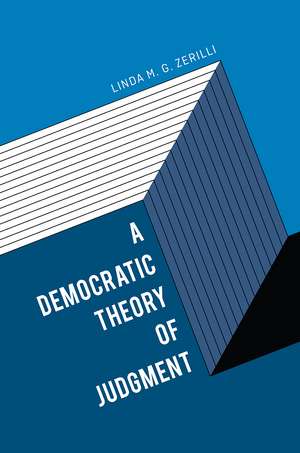A Democratic Theory of Judgment
Autor Linda M. G. Zerillien Limba Engleză Paperback – 12 dec 2016
In this sweeping look at political and philosophical history, Linda M. G. Zerilli unpacks the tightly woven core of Hannah Arendt’s unfinished work on a tenacious modern problem: how to judge critically in the wake of the collapse of inherited criteria of judgment. Engaging a remarkable breadth of thinkers, including Ludwig Wittgenstein, Leo Strauss, Immanuel Kant, Frederick Douglass, John Rawls, Jürgen Habermas, Martha Nussbaum, and many others, Zerilli clears a hopeful path between an untenable universalism and a cultural relativism that forever defers the possibility of judging at all.
Zerilli deftly outlines the limitations of existing debates, both those that concern themselves with the impossibility of judging across cultures and those that try to find transcendental, rational values to anchor judgment. Looking at Kant through the lens of Arendt, Zerilli develops the notion of a public conception of truth, and from there she explores relativism, historicism, and universalism as they shape feminist approaches to judgment. Following Arendt even further, Zerilli arrives at a hopeful new pathway—seeing the collapse of philosophical criteria for judgment not as a problem but a way to practice judgment anew as a world-building activity of democratic citizens. The result is an astonishing theoretical argument that travels through—and goes beyond—some of the most important political thought of the modern period.
Zerilli deftly outlines the limitations of existing debates, both those that concern themselves with the impossibility of judging across cultures and those that try to find transcendental, rational values to anchor judgment. Looking at Kant through the lens of Arendt, Zerilli develops the notion of a public conception of truth, and from there she explores relativism, historicism, and universalism as they shape feminist approaches to judgment. Following Arendt even further, Zerilli arrives at a hopeful new pathway—seeing the collapse of philosophical criteria for judgment not as a problem but a way to practice judgment anew as a world-building activity of democratic citizens. The result is an astonishing theoretical argument that travels through—and goes beyond—some of the most important political thought of the modern period.
Preț: 239.14 lei
Nou
Puncte Express: 359
Preț estimativ în valută:
45.76€ • 47.78$ • 37.79£
45.76€ • 47.78$ • 37.79£
Carte disponibilă
Livrare economică 26 martie-09 aprilie
Livrare express 11-15 martie pentru 30.04 lei
Preluare comenzi: 021 569.72.76
Specificații
ISBN-13: 9780226397986
ISBN-10: 022639798X
Pagini: 400
Dimensiuni: 152 x 229 x 25 mm
Greutate: 0.52 kg
Ediția:1
Editura: University of Chicago Press
Colecția University of Chicago Press
ISBN-10: 022639798X
Pagini: 400
Dimensiuni: 152 x 229 x 25 mm
Greutate: 0.52 kg
Ediția:1
Editura: University of Chicago Press
Colecția University of Chicago Press
Notă biografică
Linda M. G. Zerilli is the Charles E. Merriam Distinguished Service Professor of Political Science and professor of gender and sexuality studies at the University of Chicago. She is the author of Signifying Woman: Culture and Chaos in Rousseau, Burke, and Mill and Feminism and the Abyss of Freedom, the latter published by the University of Chicago Press.
Cuprins
Preface
Acknowledgments
1 Democracy and the Problem of Judgment
2 Judging at the “End of Reasons”: Rethinking the Aesthetic Turn
3 Historicism, Judgment, and the Limits of Liberalism: The Case of Leo Strauss
4 Objectivity, Judgment, and Freedom: Rereading Arendt’s “Truth and Politics”
5 Value Pluralism and the “Burdens of Judgment”: John Rawls’s Political Liberalism
6 Relativism and the New Universalism: Feminists Claim the Right to Judge
7 From Willing to Judging: Arendt, Habermas, and the Question of ’68
8 What on Earth Is a “Form of Life”? Judging “Alien” Cultures According to Peter Winch
9 The Turn to Affect and the Problem of Judgment: Making Political Sense of the Nonconceptual
Conclusion: Judging as a Democratic World-Building Practice
List of Abbreviations
Notes
Index
Acknowledgments
1 Democracy and the Problem of Judgment
2 Judging at the “End of Reasons”: Rethinking the Aesthetic Turn
3 Historicism, Judgment, and the Limits of Liberalism: The Case of Leo Strauss
4 Objectivity, Judgment, and Freedom: Rereading Arendt’s “Truth and Politics”
5 Value Pluralism and the “Burdens of Judgment”: John Rawls’s Political Liberalism
6 Relativism and the New Universalism: Feminists Claim the Right to Judge
7 From Willing to Judging: Arendt, Habermas, and the Question of ’68
8 What on Earth Is a “Form of Life”? Judging “Alien” Cultures According to Peter Winch
9 The Turn to Affect and the Problem of Judgment: Making Political Sense of the Nonconceptual
Conclusion: Judging as a Democratic World-Building Practice
List of Abbreviations
Notes
Index
Recenzii
"Zerilli offers a tightly argued, provocative study of judgment in a democratic, pluralistic society. She surveys some of the prominent thinkers in Western theory of the 20th century, such as Jürgen Habermas and John Rawls. In tackling her subject, Zerilli examines various schools of thought and finds most have something to contribute but fall short of the goals she has set for them. In her examination of Leo Strauss, for example, she provides readers with trenchant observations that Straussian scholars have often overlooked, and she grasps some essential arguments of Strauss that help her clarify her own position. But Hannah Arendt is whom the author finds most helpful in developing the argument that democrats must acknowledge plurality and action. The book will stimulate an important debate among theorists of democracy and modern political thought. Highly recommended."

